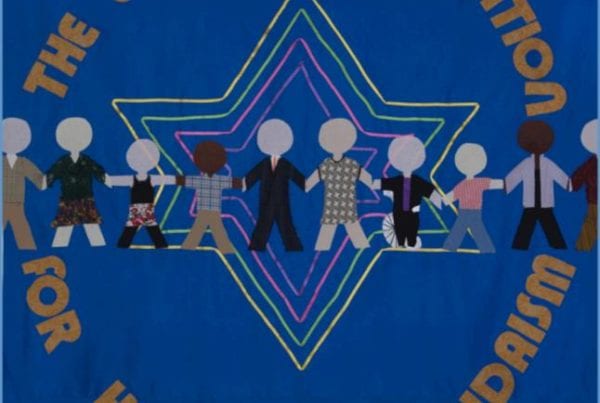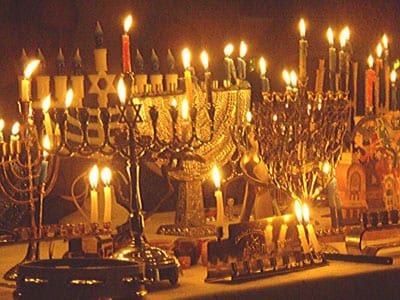Yom Kippur 2010
Forgive Me, Mother
Carol Sternhell
On Mother’s Day the nursing home—my mother’s prison—is abloom. Every resident—at least every one with relatives willing to sign a check—gets a bouquet of flowers (price on request). Volunteers in blue shirts and khakis—one of them is my son Ben—push carts full of roses and daisies and potted plants from room to room and soon bedside tables, the hospital kind on wheels, seem to have sprouted. My mother’s bouquet is big that year; by the next year, when she’s too deep in dementia to notice, we just buy a small plant. But that year, her first in the nursing home, we go all out. The card is clearly signed: from me, my sister Emily, Ben, and my nephew Dan. But my mother doesn’t read the card. (Can she still read?) The flowers, she assumes, are from my father, a man who never sent flowers. My father, at that point, has been dead for about four years.
“These are from my husband,” she tells the nurses proudly. “These are from Sid.”
To me, she adds: “Look what your father sent me! He never visits because he hates this place, but see, I knew he still loved me.”
If this is a story about forgiveness, it’s oblique, hard to decode—but that’s how I feel when I think about this topic. This is a story about forgiveness because in some sense, I think, my mother was forgiving my father for not being there with her in this strange and frightening landscape. On lucid days she was furious with him for leaving her alone. On murkier days she sometimes told me he had visited, recounted long conversations; she seemed happier on those days. (Though on one cloudy day, when she said he had just left after a wonderful visit and I asked her where he was right now, she looked at me as if I had lost my mind and said, “In the cemetery!”)
And it’s a story about forgiveness because the one choice in my own life I find difficult to forgive is putting my mother in this nursing home. It was supposedly the top nursing home on Long Island, Gurwin Jewish Geriatric Center—my sister and I chose carefully—but for most residents life there was like being an abandoned and frightened toddler left in an indifferent daycare center. “I want to go home!” Tessie’s husband Moe would shout over and over, banging on the tray of his wheelchair. My mother’s tablemate Annette, before she choked on cholent and stopped speaking, used to wheel herself over to a door, any door, and say she was planning to escape.
I probably didn’t have much choice; Ben and I live in a crowded two-bedroom apartment and for years my mother couldn’t be left alone at all, so we would have needed round-the-clock caregivers if we ever went to work or school. I know this—but perhaps even reasonable choices need to beg forgiveness. Even when I was with her—three days a week for many years—my mother felt alone. When Ben and I left her in the evening after spending all day together, she trembled. Sometimes she glared and turned away her face.
“I’m lost,” my mother said. “I can’t find myself.”
I don’t think of us as a particularly forgiving family—but I also don’t think there has been much to forgive. I was flattered when Rabbi Peter invited me to give a Yom Kippur talk—but dismayed when I learned the topic. “That is not your subject!” my friend Nancy said. It’s not that I’m bristling with grudges held; in fact, my relationships with family and friends are remarkably benign. At work, yes, there are ancient feuds, but for the most part I relish them; it’s human to disagree, and to dislike. And outside close friendship circles, yes, there are people I’ve offended with my big mouth, even here in the congregation. I’m often sorry to offend—but not, I guess, sorry enough to shut my mouth. Obviously ordinary forgiveness is the chicken soup of daily life; we all forgive each other for routine slights and errors—and even for grave hurts—as part of being human. If we can’t do that, we live in bitterness, a lonely solitude. But you all know this; it’s like preaching the virtues of motherhood, or low-fat, sugar-free apple pie. This is not my subject. That is not my pie.
The truth is—though in the course of events I forgive and ask forgiveness just like normal people—the subject kind of makes me angry. Not defensive; angry. “An eye for an eye” lacks compassion, lacks empathy—but “turn the other cheek” denies justice. What does it actually mean to “forgive” someone who has done us a great wrong? What does it mean to forgive evil? And why would you want to? The more I read on The Forgiveness Web—yes, you can Google it—the less meaning the concept has for me. A mother forgives the man, her child’s English teacher, who abducted and murdered her 16-year-old daughter. A woman forgives the husband who abused her, routinely breaking bones. A rabbi forgives the Nazis for Kristallnacht. Generally when people speak and write about these forgivings, they do so in religious or spiritual language. They pray, they meditate, they heal. Says the battered wife, “When we forgive, we release peace and restoration to the forgiven as well as to ourselves.”
I’m sorry—forgive me—but I don’t want to do that. If everything can be forgiven, the distinction between good and evil blurs.
In his book The Sunflower, Simon Wiesenthal tells a story. While imprisoned in a Nazi concentration camp, he was taken one day from his work detail to the bedside of a dying member of the SS. Haunted by the crimes in which he had participated—particularly the Jewish family he burned to death—the soldier wanted to confess to, and obtain absolution from, a Jew. Wiesenthal couldn’t do it; he remained silent. But even years after the war had ended, he struggled with the dilemma. Had he done the right thing? In his book he poses this question to a variety of philosophers. In most cases, the Jews say he did the right thing and the Christians say he should have pardoned the Nazi. In my favorite essay about this book, written by a bar mitzvah boy at a secular Jewish school in New Jersey, Daniel Bish comments: “Many Christians thought that Karl [the Nazi] would go to Heaven for repenting but Simon Wiesenthal would not.”
This story crystallizes for me my discomfort with forgiveness as a concept. I sometimes think it makes us less human, not more. I think it confuses issues that aren’t confusing at all. I think it puts victim and oppressor on an equal footing. My own worldview—rebellion, argument, justice—speaks the truth and fights the power (as we used to say a long time ago).
Of course I understand the practical advantages, both political and psychological, of forgiveness as a philosophy. Solomon Schimmel, author of Wounds Not Healed by Time: The Power of Repentance and Forgiveness, makes a useful distinction between two different types of forgiveness. Sometimes, he says, when somebody has injured you, in the interest of peace or to give a perpetrator an opportunity to reconstruct his or her life, you forego your legal or moral claim. In other cases forgiving helps you deal with your own inner feelings of anger, freeing you from feeling trapped in a web of hatred and resentment.
On a broader scale, Archibishop Desmond Tutu gave a pragmatic explanation for the amnesty granted by South Africa’s Truth and Reconciliation Commission: it was the only way to move forward as a democratic, non-apartheid, nation. “Is the amnesty too heavy a price to pay?” he asked. “It is a very heavy price to pay. But having said that, you have to ask, what is the alternative?”
Daily life is personal—I care more about where Ben goes to college than about worldwide economic injustice—but to me, forgiveness as a concept is deeply political. In personal relationships, forgiveness requires sincere repentance, and when possible restitution. It also, according to the medieval Jewish philosopher Moses Maimonides, requires the sinner to face the occasion of sin again and not repeat the sin. On the broad scale of great wrongs, however, these precepts are rarely possible. To me, then, forgiveness only has meaning in a political and ethical context. It must include truth: acknowledgement of right and wrong. It must include a commitment to change so that the wrong won’t be repeated. Truth: remembrance of the past. Change: a road to a better future.
Reconciliation isn’t enough. Desmond Tutu says, “What is happening at home in South Africa is that we are saying we genuinely want bygones to be bygones, but not in a glib way that people don’t take account of what has happened, because then they won’t be bygones.”
But wallowing in anger isn’t enough either. It is more important to work for change than to brood on past wrongs. Forgiveness mavens write about “healing” the world by forgiving their enemies, but to me a phrase like “tikkun olam”—we use it often in this congregation—means healing the world through political work, work for social, sexual, and economic justice.
My mother’s nursing home is run by Orthodox Jews and at their Yom Kippur service every year they asked god to “pardon us, forgive us, atone for us and seal us in the Book of Life.” The first time my mother heard this, when she still could speak and understand, she said, Feh. “Next year,” the rabbi said, thinking ahead to Passover, “may we be in Jerusalem.” Annette said she didn’t live in Jerusalem, she lived on Delancey. My mother said the Grand Concourse, near the steps.
One rainy Wednesday of the year before she died, my mother told me she had just been to visit her parents at that Grand Concourse apartment. “I know where they are,” she said, “they haven’t moved. They were very glad to see me. They said my brother Bernie comes often. My mother made fruit. She makes such good fruit.”
The other night, while I was writing this, I had a dream about my mother. I have a lot of those dreams. Once I was raking the leaves off her in a forest somewhere and she was shivering with cold. Sometimes I can’t reach her; I hear her calling me in her wavering frightened voice, but the path is dark and keeps turning the wrong way. Often I’m holding her the way you would cradle a baby. And she was like a baby those last years: in diapers, unable to feed herself, eating pureed chicken and peas. Ben would walk her in her wheelchair the way you’d walk a baby in a carriage. Sometimes in dreams she’s her old self, Mommy, the brilliantly competent librarian, but usually she’s suffering and I’m trying, and failing, to help. This time she was lying in the back of my car wrapped tightly in a blanket. She seemed to have a fever; she was pale and damp and hot. I was driving, driving somewhere, driving fast.
Sometimes when I visited, and mentioned that my sister Emily had just been there earlier, my mother would say, “But where’s the other one?” She only had two daughters, but maybe we weren’t enough.
“I’m lost,” my mother said. “I’ve lost myself. I can’t get found.”
Forgive me, mother, for letting you get lost. Maybe someday, in a dream, I’ll find you on the Grand Concourse, sitting by the kitchen window where the sun always streamed in. I’ll be very glad to see you. We’ll eat fruit.



